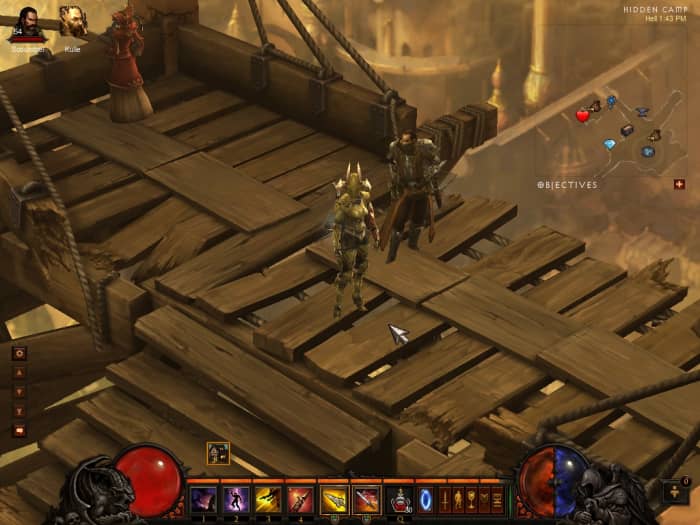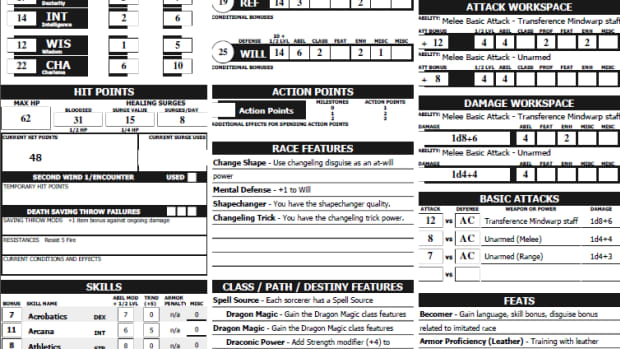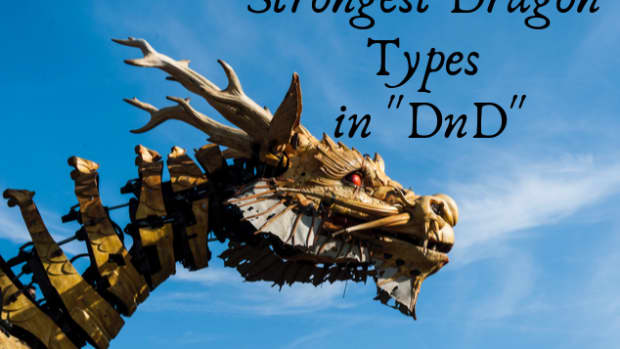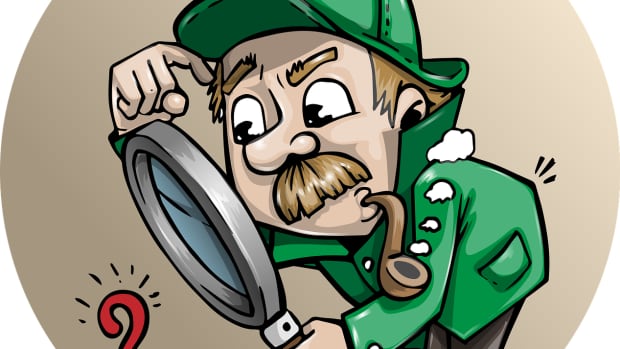How to Play a Chaotic-Neutral Character in "Dungeons and Dragons"
What Is Chaotic-Neutral?
Chaotic-neutral is a character alignment in the tabletop roleplaying game Dungeons and Dragons. Character alignments essentially describe how a character behaves and makes decisions based on their personality and beliefs. The alignments are often relatable to fictional characters in books, television, and movies. The Dungeons and Dragons Player’s Handbook 3.5 describes chaotic-neutral as:
“... the best alignment you can be because it represents true freedom from both society’s restrictions and a do-gooder’s zeal.” (p. 105)
The chaotic-neutral character (sometimes referred to as the “free spirit”) follows their own whims and is forever an individualist. Chaotic neutral characters value their freedom above all else, and while they believe others should be entitled to freedom as well, they do not go out of their way to protect them. In Dungeons and Dragons, having a chaotic-neutral alignment influences certain actions and responses your character will make to people and situations. This alignment avoids authority and dislikes restrictions. A chaotic-neutral character would not fall in line under a bossy, authoritative figure or meekly spend his time in a cell or under guarded watch.
You long for freedom. You long to do what you want to do because you want it. To act on selfish impulse. You want to see what it's like. One day you won't be able to resist.
— Jack Sparrow in Pirates of the Caribbean: Dead Man's Chest
What Do They Believe In?
Chaotic-neutral characters do not believe in order in the universe, including their own decisions; because of this, they follow their whims with no problem. Since neither good nor evil matters to them, Chaotic-neutral characters act on their immediate desires without a guilty conscience. If a Chaotic-neutral character believes fervently in anything, it is that freedom is a necessary part of life. Anything that infringes upon personal freedom is an obstacle that must be destroyed.
Personality Characteristics
- complete unreliability
- Practicing self-indulgence
- Acting rebellious
- Having no predictability
- Excessive greed
- Self-centered attitude
It’s hard to rely on a chaotic-neutral character unless the situation involves personal friends and family members; they are only likely to betray them in the worst dead-end situation. Furthermore, they place their desires above everyone else. Their life and happiness are the most important to them, which means they deserve the best deals and the best cut of the loot. The character might not even be motivated by wealth, simply the desire to see the results of their reckless decisions.
Chaotic-neutral characters don’t respond well to authority and will, in turn, rebel against the law. They are otherwise unpredictable at best; if someone is standing in between a chaotic-neutral adventurer and a strong desire such as gold or food, the adventurer could either attack or leave it be. Chaotic-neutral characters are often seen as greedy because of their actions, and some are. However, their erratic decisions when it comes to fame or fortune can simply give the appearance of greed. Either way, these characters don’t care—they harbor a self-centered outlook on life and feel little about what other people think of them.
Make sense? Oh, what fun is there in making sense?
— Discord in My Little Pony: Friendship is Magic
Fighting Tactics of a Chaotic-Neutral Character
The way a chaotic-neutral character behaves in a Dungeons and Dragons campaign is key to maintaining their alignment and personality. There are certain actions that characters of this alignment will and will not perform. Their interactions with other campaign members also follow their alignment.
What Might They Do in a Fight?
- Act unfairly in a fight
- Refuse a fair fight or contest
- Run away from a losing battle
- Taunt their enemy into battling
- Brag about their victories
My brother taught me when we were younger. He thought the crossbow was the best weapon for me since it would give me time to run away if I botched things too badly.
— Lyndon in Diablo 3
As chaotic-neutral characters have their best desires and interests at heart, they are unlikely to die valiantly in battle when they can flee or remain honorable in a fight when it could cost them their life. Just the same, they can bask in their victories, winding up tall tales about battles won, or taunt their enemies into fighting even when they don’t want to.
What Don't They Do?
- Let a disarmed enemy get their weapon
- Let their enemy attack first
- Surrender to an enemy
- Be taken prisoner by an enemy
- Kill a host or an innocent
If the chaotic-neutral adventurer has the upper hand in battle, the situation is more favorable to them. Letting the enemy attack first or retrieve his weapon would be uncharacteristic of the adventurer’s nature. Similarly, the chaotic-neutral character normally would not surrender to an enemy or allow himself to be captured; this would infringe on his freedom, the most valuable thing in his life. Furthermore, Chaotic Neutral adventurers have no desire to murder innocent bystanders, only those who threaten them or stand in their way.
Social Values of These Characters
Chaotic-neutral characters may seem like a handful, but they aren’t shunned by society nor necessarily hated by others. After all, they will support their town, city or place of living if brings profit, or rescue a citizen if they were receiving a handsome sum in return.
Social Values of a Chaotic-Neutral
- Flexible romantic relationships
- Circle of close friends they won’t betray
- Supporting their nation when advantageous
- Not supporting authority figures
- Not harming people for profit
Being in a strict, tight romantic relationship denies a chaotic-neutral character the freedom he values most; relationships need to have flexibility, variety and no serious undertones. Captain Jack Sparrow of Pirates of the Caribbean is a popular chaotic neutral character—think about his love life. When women see and recognize Jack Sparrow, he is usually met with a slap to the face or harsh words.
Chaotic-neutral characters aren’t friends with many, but they tend to have a small circle of close friends they would never betray ... unless it’s a matter of life and death. However, the character will not usually hurt or murder innocents for profit. Murder isn’t a neutral trait—it steps into the boundary of evil, and chaotic-neutral characters balance their decisions on an axis of good and evil.

Lyndon, a scoundrel, has a chaotic nature but still remains allied with the player.
Source: Jessica Marello, Fair Use; Diablo 3 (videogame)
Finally, the chaotic-neutral character is willing to support his hometown or nation when there is an advantage or profit in it—he will not support his homeland out of honor or a “just” cause. Furthermore, he doesn’t support most governments, seeing most rulers as corrupt authority figures. If your character is chaotic-neutral, always remember how much this alignment is against restrictive authority.
Who Can Be a Chaotic-Neutral Character?
Literally any race in the Dungeons and Dragons universe can be chaotic-neutral. While some races, such as Half-Orcs or Half-Elves, have a higher tendency to claim this alignment, the option is open to any race you can imagine. A chaotic-neutral alignment relies more on a character’s class than its race or other values; a human rogue will most likely have a chaotic-neutral nature, while a human Paladin will never be chaotic-neutral. When deciding on a race, your character has most available options.
| Character Races | Favored Alignments |
|---|---|
Humans | No preference |
Dwarves | Lawful, Good |
Elves | Chaotic, Good |
Gnomes | Good, Chaotic |
Half-Elves | Chaotic Good, Chaotic Evil |
Half-Orcs | Chaotic Good, Chaotic Evil |
Halflings | Neutral |
There are certain classes in Dungeons and Dragons whose alignments are set in stone or less malleable; a paladin must always be lawful-good, for example. Any character class that essentially relies upon law and order cannot properly be chaotic-neutral. If you are playing a barbarian, your character can be of any alignment as long as it is nonlawful; likewise, a monk is restricted to a lawful alignment due to a path of strict discipline.
| Character Classes | Favored Alignments |
|---|---|
Barbarian | Any nonlawful |
Bard | Any nonlawful |
Cleric | Any alignment |
Druid | Any neutral |
Fighter | Any alignment |
Monk | Any lawful |
Paladin | Lawful Good |
Ranger | Any alignment |
Rogue | Any chaotic |
Sorcerer | Any chaotic |
Wizard | Any lawful/chaotic |
Are You Up for It?
Then there is the matter of you and your roleplaying. Would you enjoy playing a character who is, in the end, only out for themselves? Would you mind betraying your friends if it meant survival or escaping from capture? Could you make unpredictable decisions to favor chaos in the world? Whether it’s your preferred playing style or you’re up to the challenge, perhaps it’s about time you gave chaotic-neutral a try. And remember to have some fun!
Note: many alignments were removed from Dungeons and Dragons 4th Edition. In this edition, you have the option between Good, Lawful, Evil, Chaotic Evil and Unaligned.
© 2013 Jessica Peri
Comments
Jessica Peri (author) from United States on March 12, 2016:
@bensen32 Thank you for reading! I haven't gotten to properly playing 5e yet, but I'll look into the rules and see how things have changed. Most of my characters end up being Chaotic Neutral, with Chaotic Good being a close second.
Thomas Bensen from Wisconsin on March 11, 2016:
I know this has been up a while and based on the 3.5 rules seeing the 5e rules have changed but this is a great "basic" idea of Chaotic Neutral character. CN is by far my favorite alignment to play, thanks for sharing this with us.
Jessica Peri (author) from United States on April 29, 2013:
Thanks for the feedback! I think it's sort of like saying that they have limits - yes, they are greedy but aren't going to intentionally hurt or murder innocent people for profit. I think that would make them more evil than neutral. I hope to go back and make this hub a bit more clear, and appreciate your comment.
Toni on April 28, 2013:
I always was a Neutral good character, I started playing in pathfinder society campain and I wanted change so I choose a CN character. I read the CN charater assesment in the book but didn't really understand it. This article help me understand more of what a CN character would do which I could have fun role-playing. One this is you said they are greedy yet they won't harm a person for profit, which to me makes no sense.
Jessica Peri (author) from United States on January 23, 2013:
I really appreciate the feedback! This took me a while because it is tough - like you said, it's hard to say what they will do. Perhaps I should tweak the wording more to "most likely" instead of it being set in stone. If anything I was hoping to provide a basic guide for the newcomer to get ideas from. Thanks so much for reading and rating! I love constructive feedback, and love your comment. I'll try to fix things up!
Jeff Berndt from Southeast Michigan on January 23, 2013:
An interesting article, Dreamhowl, but I have to disagree on some points.
You gave a list of examples of things that a chaotic neutral character would never do, but a CN character might do any of them, for any reason.
For example, he might let a disarmed enemy retrieve his weapon simply because he was enjoying the fight and wants it to continue!
It's also important to point out that a CN character isn't necessarily always going to defy authority on principle. If the authority figure is giving smart orders that make sense (to the CN character, at least) then there's no reason for him /not/ to obey. Why /wouldn't/ a CN character harm someone else for profit? He might not make it his career, but what if he just wanted to see if he could do it, or it sounded like it might be fun this time?
I also take issue with your characterization of Han Solo as Chaotic Neutral. I think a much stronger case can be made for Neutral Good.
Really, there's no one right way to play a CN character, but when I play one, I try to imagine what a six-year-old might do in the given situation, and have the character do that.
Overall, though, I enjoyed the article, and rated it Interesting.
Keep it up!








